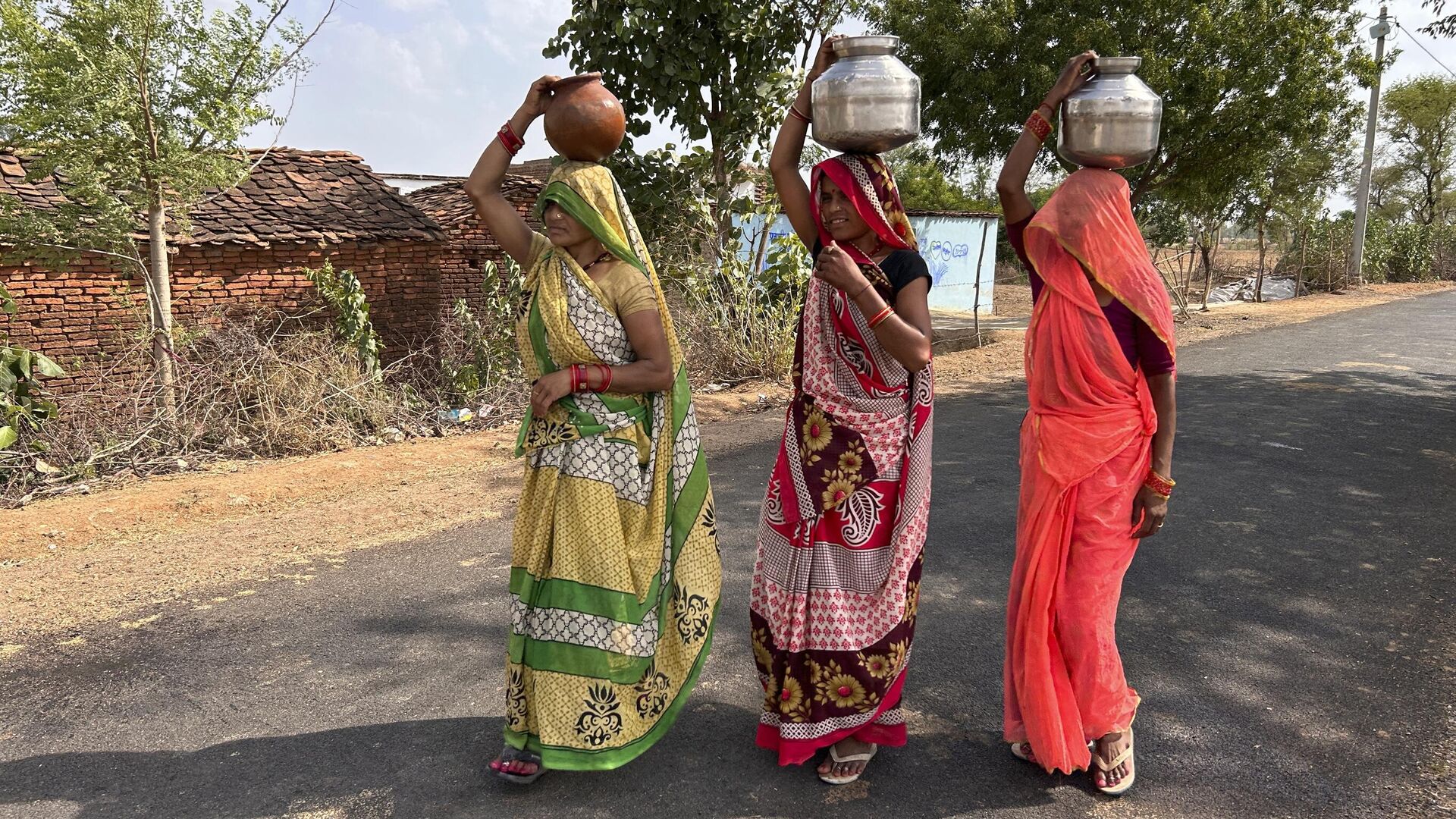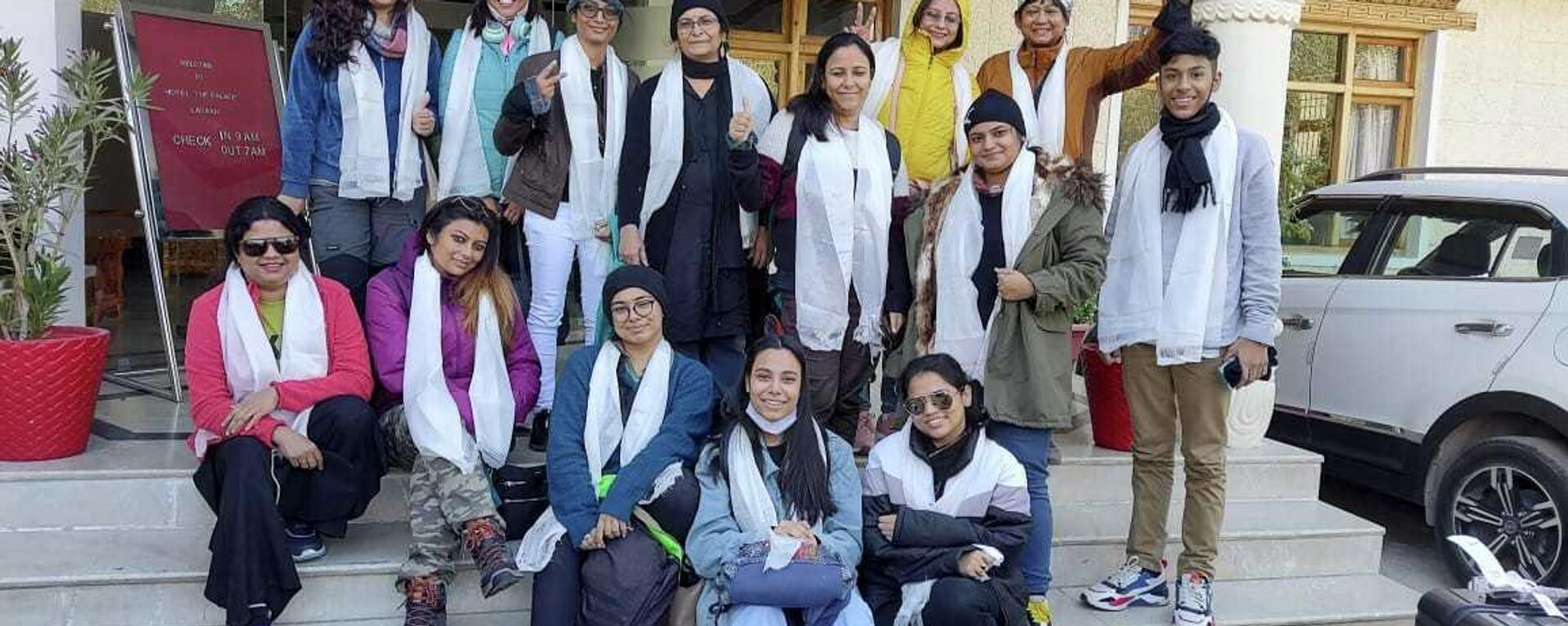https://sputniknews.in/20230907/legislation-can-increase-female-participation-in-workforce-industry-rep-4076092.html
Legislation Can Increase Female Participation in Workforce: Industry Rep
Legislation Can Increase Female Participation in Workforce: Industry Rep
Sputnik India
India ranks 135 out of 146 countries in terms of employability gender gap, revealed the World Economic Forum's Gender Gap Report 2022. It is behind countries like Sri Lanka, Bangladesh and Nepal.
2023-09-07T13:05+0530
2023-09-07T13:05+0530
2023-09-07T13:05+0530
sputnik opinion
india
government of india
delhi
new delhi
women empowerment
women's rights
women's education
the united nations (un)
https://cdn1.img.sputniknews.in/img/07e7/06/14/2574607_0:319:2730:1856_1920x0_80_0_0_ec343fdae7766761e00806b74878716a.jpg
India ranks 135 out of 146 countries in terms of employability gender gap, revealed the World Economic Forum's Gender Gap Report 2022. It is behind countries like Sri Lanka, Bangladesh and Nepal.However, efforts are on to improve the female labor force participation rate, which recent government data shows has been stagnant in recent years. As per government data, 29.4 percent of women aged 15-59 were part of country’s labor force in 2021-22 compared to 29.8 percent the preceding year.As part of efforts to revert this, as well as to recognize the exemplary female leaders in the corporate sector, the Confederation of Indian Industry (CII) organized the ‘CII Corporate Women Leadership Awards’.The industry body also held a panel discussion on “Women in the Corporate World: Changing Economic Landscape & Driving Growth” where panelists deliberated on the initiatives that can be pursued by the Indian industry to include more women in corporate roles, and more importantly as part of the leadership.On the sidelines of the awards, Chairwoman of the CII Steering Committee Rhumjhum Chatterjee shared her thoughts about women being drivers of economic growth, their participation in the workforce and initiatives of the government towards women empowerment with Sputnik India.Sputnik: We discussed "Women in the Corporate World: Changing Economic Landscape & Driving Growth". However, some reports suggest that the participation of women in the workforce in India is one of the lowest globally. In such a scenario, how do you think women can become drivers of economic growth?Chatterjee: First we have to understand the fact that when we look at Indian industry, 73 percent of organizations are medium and small scale while many of them are those who had started their entrepreneurial journey only a few years ago.Secondly, we should further increase the participation of women in the leadership role in the large and medium industries. However, there has been a little shift towards more women taking up leadership positions in the large and medium industries in recent years.However, I believe that we still have to bring a difference in the larger part which is MSME [Micro, Small and Medium Enterprise] sector.Sputnik: A 2023 report by the State Bank of India suggests that the total of unpaid women’s contribution to the economy is around $27.3 billion—approximately 7.5 percent of India’s GDP. How can this issue be addressed?Chatterjee: It is true but it has two aspects. The first is that maximum numbers of women are engaged in the agriculture sector. They are investing their time and energy for almost no economic gain for themselves. They would have added something to the GDP if they would have been employed in some formal sector or doing something of their own.The second aspect is that most of the time of women go into the household chores like taking care of children, cooking, etc. These all are important work but are seen as non-productive and have no economic gain.Sputnik: A lot of women are working in unorganized sectors like agriculture or construction where they face increased exploitation, poor working conditions, lack of mobility, and higher risk of violence. How do you think it can be addressed?Chatterjee: I believe this can only be done by legislation. I think we have to recognize - and the UN has been talking about it for a long while - that working without any economic consideration is not to be allowed anymore.There is also evidence, particularly since you mentioned the construction sector, that on the rota of those who are employed are men. He then gives the charge to the woman (his wife or someone from his family) and then he’s just relaxing while she is doing all the work. Here she won’t be counted as an employee and is working on behalf of her husband. They are even getting paid for one person.So, we have to bring an end to such practices which can be done by bringing the unorganized sectors under the ambit of the organized sectors. It will help not only the employees but also the industry. Employees will be benefitted tremendously as the earning members will increase while some other perks will also get added while the economic gain will be added to the overall growth.Sputnik: With so much gender inequality in terms of female employment and women in the corporate world, how do you think we can empower women in today’s era?Chatterjee: I think women are a lot more empowered than we have seen in the past. They themselves will realize. Apart from this, women’s ability to be exposed to all that is happening around is also empowering them.Sputnik: As you talked about government policies, there have been several reforms introduced by the government for female empowerment. Do you think that the initiatives point in the right direction and what additionally should be done?Chatterjee: I completely believe that things are [going] in the right direction and what I like about this government is that apart from coming with the policies they have understood that when we talk about women-led development, it is about ensuring that whatever decision-making platforms are now being brought up or being used there is women’s voice in that.This is a big step towards women empowerment and once this starts happening you will see the difference in the way that we structure our policies and that will lead to positive outcomes socially as well.Sputnik: What would you additionally suggest to increase the participation of women in the corporate world and thus contribute to economic growth?Chatterjee: We need to understand that the corporate sector doesn't necessarily mean BSE100 companies. MSMEs are huge contributors to the industry and economic growth so if we are able to push the needle on that front, I think it will help tremendously.Apart from this, a push should be given to entrepreneurship also so that all the start-ups, new ventures etc. which are led by women get a boost.I would like to give an example here of CII, it promotes women exemplar awards from the last 17 years where we identify women at the grassroot level. Many women started at micro enterprise level and now they have gown and sustained. This has happened to such a great extent that even male members of their families left their jobs or whatever they were doing and joined them. So, that’s a very positive sign.
https://sputniknews.in/20230813/how-indian-women-rediscover-life-through-group-travel-3480848.html
india
delhi
new delhi
Sputnik India
feedback.hindi@sputniknews.com
+74956456601
MIA „Rossiya Segodnya“
2023
Rahul Trivedi
https://cdn1.img.sputniknews.in/img/07e6/0c/13/136500_0:0:628:627_100x100_80_0_0_72097ff894c7446b70d2efafcb719720.jpg
Rahul Trivedi
https://cdn1.img.sputniknews.in/img/07e6/0c/13/136500_0:0:628:627_100x100_80_0_0_72097ff894c7446b70d2efafcb719720.jpg
News
en_IN
Sputnik India
feedback.hindi@sputniknews.com
+74956456601
MIA „Rossiya Segodnya“
Sputnik India
feedback.hindi@sputniknews.com
+74956456601
MIA „Rossiya Segodnya“
Rahul Trivedi
https://cdn1.img.sputniknews.in/img/07e6/0c/13/136500_0:0:628:627_100x100_80_0_0_72097ff894c7446b70d2efafcb719720.jpg
employability gender gap, world economic forum's gender gap report 2022, female labour force participation rate, exemplary women leaders in the corporate sector, confederation of indian industry, cii corporate women leadership awards, rhumjhum chatterjee, women empowerment, economic growth, women taking up leadership positions, msme, women engaged in agriculture sector
employability gender gap, world economic forum's gender gap report 2022, female labour force participation rate, exemplary women leaders in the corporate sector, confederation of indian industry, cii corporate women leadership awards, rhumjhum chatterjee, women empowerment, economic growth, women taking up leadership positions, msme, women engaged in agriculture sector
Legislation Can Increase Female Participation in Workforce: Industry Rep
According to media reports quoting data from the International Labour Organization (ILO), the employability gender gap in India is 50.9 percent, as only 19.2 percent of all women are in the labor force compared to 70.1 percent of men.
India ranks 135 out of 146 countries in terms of employability gender gap, revealed the World Economic Forum's Gender Gap Report 2022. It is behind countries like Sri Lanka, Bangladesh and Nepal.
However, efforts are on to improve the
female labor force participation rate, which recent government data shows has been stagnant in recent years. As per government data, 29.4 percent of women aged 15-59 were part of country’s labor force in 2021-22 compared to 29.8 percent the preceding year.
As part of efforts to revert this, as well as to recognize the exemplary female leaders in the corporate sector, the Confederation of Indian Industry (CII) organized the ‘CII Corporate Women Leadership Awards’.
The industry body also held a panel discussion on
“Women in the Corporate World: Changing Economic Landscape & Driving Growth” where panelists deliberated on the initiatives that can be pursued by the
Indian industry to include more women in corporate roles, and more importantly as part of the leadership.
On the sidelines of the awards, Chairwoman of the CII Steering Committee
Rhumjhum Chatterjee shared her thoughts about women being drivers of
economic growth, their participation in the workforce and initiatives of the government towards women empowerment with
Sputnik India.
Sputnik: We discussed "Women in the Corporate World: Changing Economic Landscape & Driving Growth". However, some reports suggest that the participation of women in the workforce in India is one of the lowest globally. In such a scenario, how do you think women can become drivers of economic growth?
Chatterjee: First we have to understand the fact that when we look at Indian industry, 73 percent of organizations are medium and small scale while many of them are those who had started their entrepreneurial journey only a few years ago.
Now as far as women becoming drivers of economic growth is concerned, I believe this can be done in two ways. As we see a huge shift of women starting their own ventures so first we have to give some nurturing, sustenance, mentoring etc. will flourish and grow further to become employers of a few more which would benefit the industry and thus augmenting the economic growth.
Secondly, we should further increase the participation of
women in the leadership role in the large and medium industries. However, there has been a little shift towards more women taking up leadership positions in the large and medium industries in recent years.
However, I believe that we still have to bring a difference in the larger part which is MSME [Micro, Small and Medium Enterprise] sector.
Sputnik: A 2023 report by the State Bank of India suggests that the total of unpaid women’s contribution to the economy is around $27.3 billion—approximately 7.5 percent of India’s GDP. How can this issue be addressed?
Chatterjee: It is true but it has two aspects. The first is that maximum numbers of women are engaged in the agriculture sector. They are investing their time and energy for almost no economic gain for themselves. They would have added something to the GDP if they would have been employed in some formal sector or doing something of their own.
The second aspect is that most of the time of women go into the household chores like taking care of children, cooking, etc. These all are important work but are seen as non-productive and have no economic gain.
I think this can be resolved if men start taking equal responsibilities in doing household chores. We shouldn’t be stereotyping the next generation into believing that work like taking care of children or cooking has to be done by women only. If men also start taking equal responsibility, I think it will make a huge difference.
Sputnik: A lot of women are working in unorganized sectors like agriculture or construction where they face increased exploitation, poor working conditions, lack of mobility, and higher risk of violence. How do you think it can be addressed?
Chatterjee: I believe this can only be done by legislation. I think we have to recognize - and the UN has been talking about it for a long while - that working without any economic consideration is not to be allowed anymore.
There is also evidence, particularly since you mentioned the construction sector, that on the rota of those who are employed are men. He then gives the charge to the woman (his wife or someone from his family) and then he’s just relaxing while she is doing all the work. Here she won’t be counted as an employee and is working on behalf of her husband. They are even getting paid for one person.
So, we have to bring an end to such practices which can be done by bringing the unorganized sectors under the ambit of the organized sectors. It will help not only the employees but also the industry. Employees will be benefitted tremendously as the earning members will increase while some other perks will also get added while the economic gain will be added to the overall growth.
Sputnik: With so much gender inequality in terms of female employment and women in the corporate world, how do you think we can empower women in today’s era?
Chatterjee: I think women are a lot more empowered than we have seen in the past. They themselves will realize. Apart from this, women’s ability to be exposed to all that is happening around is also empowering them.
Along with this, I think a lot is being done by the government towards women empowerment. There are a set of policies that address the issues of women and helping them out in every aspect.
Sputnik: As you talked about government policies, there have been several reforms introduced by the government for female empowerment. Do you think that the initiatives point in the right direction and what additionally should be done?
Chatterjee: I completely believe that things are [going] in the right direction and what I like about this government is that apart from coming with the policies they have understood that when we talk about women-led development, it is about ensuring that whatever decision-making platforms are now being brought up or being used there is women’s voice in that.
This is a
big step towards women empowerment and once this starts happening you will see the difference in the way that we structure our policies and that will lead to positive outcomes socially as well.
Sputnik: What would you additionally suggest to increase the participation of women in the corporate world and thus contribute to economic growth?
Chatterjee: We need to understand that the corporate sector doesn't necessarily mean BSE100 companies. MSMEs are huge contributors to the industry and economic growth so if we are able to push the needle on that front, I think it will help tremendously.
Apart from this, a push should be given to entrepreneurship also so that all the start-ups, new ventures etc. which are led by women get a boost.
I would like to give an example here of CII, it promotes women exemplar awards from the last 17 years where we identify women at the grassroot level. Many women started at micro enterprise level and now they have gown and sustained. This has happened to such a great extent that even male members of their families left their jobs or whatever they were doing and joined them. So, that’s a very positive sign.



